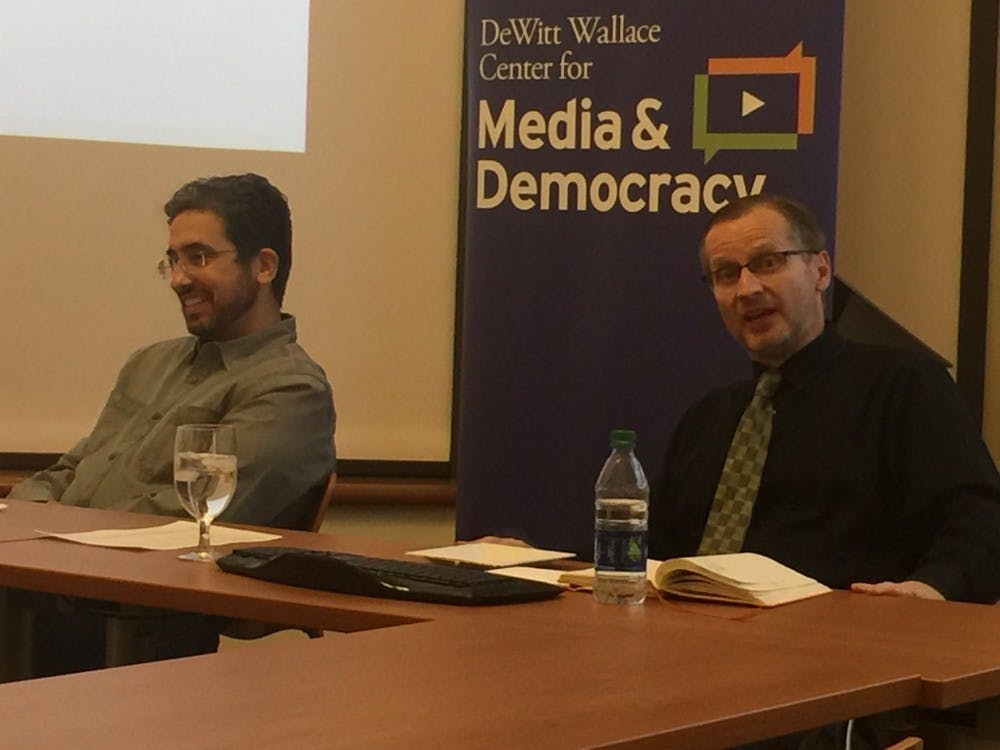As long as the role and nature of the Internet remain ambiguous, the federal government will have a hard time launching regulations on net neutrality, two public policy professors said at a panel Friday.
“The internet is like a bad boy or girl who is new in town,” said Ken Rogerson, associate professor of the practice in the Sanford School of Public Policy. “You are in a relationship with the internet, and your parents—the government in this case—haven’t decided how to deal with this new kid.”
Although the internet has a lot in common with its precedents such as radio, telephone and television, there are key differences, Rogerson said. He argued that when making rules regarding net neutrality, policymakers need to refer to previous examples but not entirely rely on them.
Net neutrality is a principle that government is responsible for ensuring equal and free access to the content on the Internet among all users, said Philip Napoli, James R. Shepley professor of public policy.
Without the limitation of net neutrality, internet service providers (ISPs) such as Comcast and AT&T have the right to block content, slow down the speed of internet access or prioritize the delivery of specific content, either affiliated to their own company or that of a content provider such as Netflix, Napoli said.
Under the Obama administration, the Federal Communications Commission enforced rules to enforce net neutrality. Things have changed after President Donald Trump took office—last month, the FCC voted to repeal these rules, prompting large-scale controversy.
Telephone service has almost always been a public good in the United States, Rogerson said. The government actively subsidized providers and limited competition to ensure universal access.
In contrast, although the government also subsided radio and television when they burgeoned, Rogerson added that they later relied on advertisements as a source of revenue.
“Which model [among telephone, radio and television] the government should adopt on the internet depends on whether they see the internet as a public good or not,” Rogerson said.
Whether internet service provision is a telecommunications service or an information service determines whether ISPs need to comply with net neutrality, Napoli explained.
“When the internet develops, it develops all the backbone of the telephone infrastructure,” he said.
Net neutrality is an extension of the concept of a common carrier, a term often used to define the telephone service, Napoli said. As a common carrier, the provider of telephone service—or telecommunications service at large—is not allowed to discriminate against its users.
“Telecommunications service is just like the postal service,” Napoli said. “Whoever pays the fee gets to deliver.”
In the early time of the internet, users relied on a dial-up system to access the online content—which involved a telephone network that delivered users to the ISP—in addition to the ISP itself, which connected users online, Napoli said. He noted that the former is a common carrier but the latter is not.
ISPs nowadays function as both a telecommunications network and the provider of information service, Napoli said. It is therefore unclear if they are still common carriers, making it difficult to decide whether net neutrality applies or not.
The FCC defined ISPs as telecommunications service providers under former President Barack Obama, but now defines them as information service providers, as it did before Obama came into office.
Napoli said advocates who are against net neutrality argue that government restrictions will impede investments in the internet business.
However, loosening net neutrality harms start-ups much more than established internet companies, he added, explaining that it may hinder innovation in the information industry as a result.
“The absence of net neutrality erects a barrier to entry into the network,” Napoli said. “[Eliminating net neutrality] will be undermining the exact openness that facilitated innovation and gave us Google and Facebook.”
The lack of net neutrality will also influence people’s right to free speech online, Napoli added.
“How will this new policy shape our political discourse is still unclear,” Napoli said. “But worst case scenario, we are granting internet service providers an incredible amount of authority to regulate the flow of speech.”
Net neutrality was a concept that Columbia University law professor Tim Wu coined in 2003, noted William Chang, a first-year who attended the event.
“The internet is evolving so rapidly that the original meaning of the concept may not apply any longer,” he said. “I came to this event to find out if it is the case.”
Because the internet is developing at an unprecedented rate, regulations are very likely to lag behind, he said, adding that it is therefore critical for policymakers to revise internet-related policies constantly.
Get The Chronicle straight to your inbox
Signup for our weekly newsletter. Cancel at any time.

